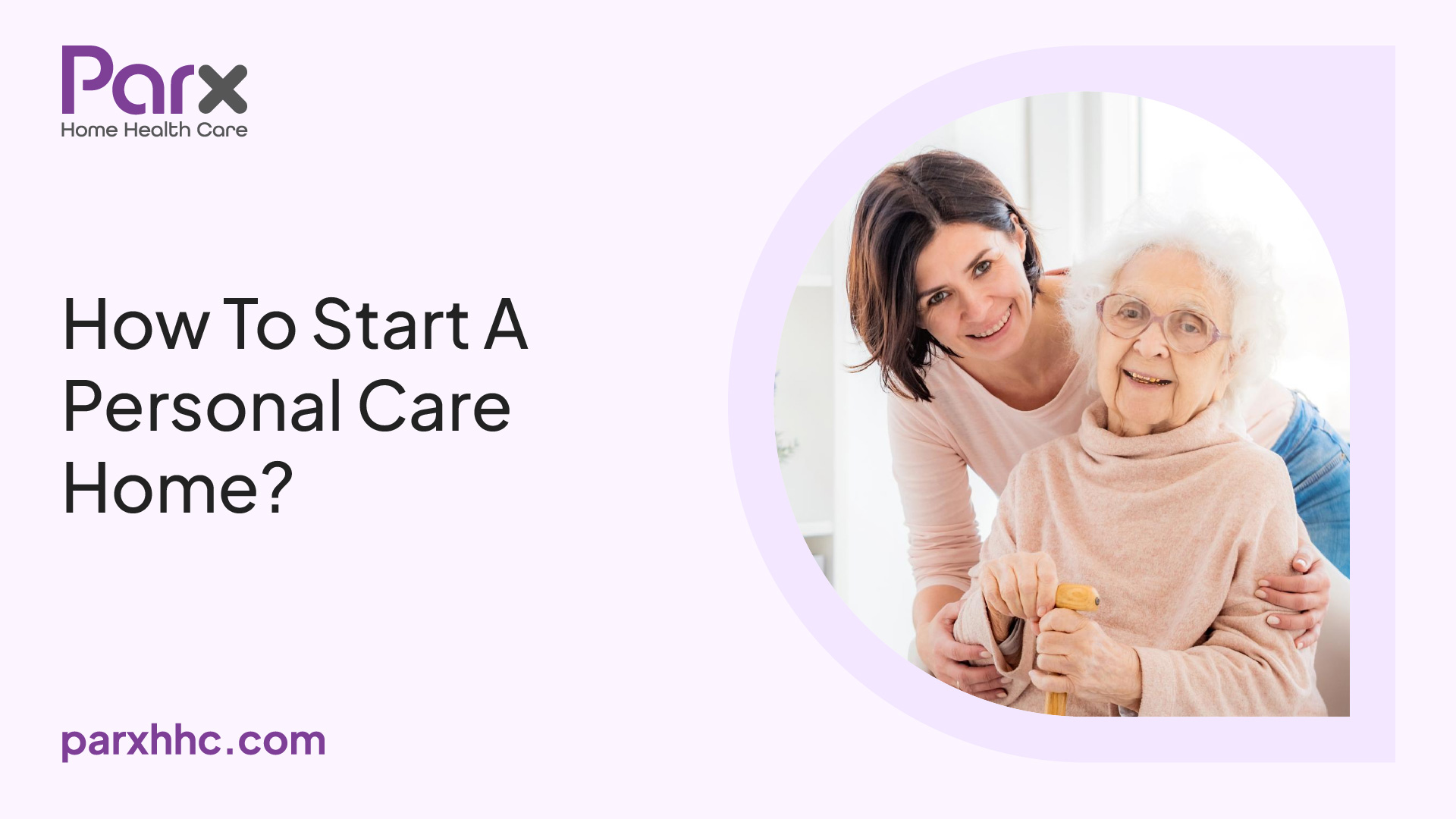How To Start A Personal Care Home?
Embark on a compassionate journey with our guide on how to start a personal care home. Beyond the logistics, discover the heart and soul of creating a nurturing space where individuals can thrive.

The Caregiver's Path to Entrepreneurship
Starting a personal care home business is an entrepreneurial path that many family caregivers embark on to provide quality care for seniors and individuals in need. As a family caregiver, you have firsthand experience and a deep understanding of the challenges faced by those requiring assistance and support. This unique perspective positions you to make a meaningful impact on the lives of others through the establishment of a personal care home.

A personal care home offers a supportive and nurturing environment for individuals who require assistance with activities of daily living, such as bathing, dressing, medication management, and meal preparation. By starting a personal care home business, you can create a safe and comfortable space where residents can receive the care and attention they need while maintaining a sense of independence and dignity.
Why Consider Starting a Personal Care Home Business
There are several compelling reasons why family caregivers choose to start a personal care home business. Here are a few key motivations:
- Passion for caregiving: Family caregivers often develop a deep passion for caregiving as they care for their loved ones. Starting a personal care home business allows them to extend their caregiving expertise to a wider community and positively impact the lives of more individuals in need.
- Fulfilling a need in the community: The demand for personal care homes continues to grow as the aging population increases. By establishing a personal care home, family caregivers can contribute to meeting this growing need and provide a valuable service within their community.
- Flexibility and independence: Starting a personal care home business allows family caregivers to have control over their work schedule and the ability to create a work-life balance that suits their needs. This level of flexibility and independence can be especially beneficial for individuals who have caregiving responsibilities for their own family members.
- Entrepreneurial opportunities: For family caregivers seeking new professional avenues, starting a personal care home business presents an opportunity to combine their caregiving skills with entrepreneurship. This allows them to build a business around their passion and develop a fulfilling and sustainable career.
- Financial stability: Personal care homes can be financially rewarding ventures. Alongside the satisfaction of making a difference in people's lives, family caregivers can generate income by providing high-quality care to residents. Startup costs and financial considerations are important factors to consider and can vary based on location, facility requirements, and licensing regulations.
Starting a personal care home business is a significant undertaking, but it can also be immensely rewarding. Before embarking on this journey, it's essential to familiarize yourself with the licensing and regulatory requirements for personal care homes in your area.
In the next sections, we will delve deeper into the intricacies of personal care homes, the steps involved in starting a personal care home business, and the strategies for providing quality care to residents.

Understanding Personal Care Homes
For individuals considering starting a personal care home business, it's important to have a clear understanding of what personal care homes are and the licensing and regulations associated with them.
What is a Personal Care Home?
A personal care home is a residential facility that provides assistance and support to individuals who require assistance with activities of daily living. These homes offer a safe and comfortable environment for individuals who may not be able to live independently due to age, physical disabilities, or chronic illnesses. Personal care homes typically offer services such as meals, medication management, assistance with bathing and grooming, housekeeping, and social activities.
The goal of a personal care home is to provide a nurturing and supportive environment that promotes the well-being and dignity of its residents. These homes often become a second family for the individuals who reside there, providing personalized care and a sense of community.
Licensing and Regulations
Operating a personal care home business requires compliance with various licensing and regulations. These requirements ensure that personal care homes maintain high standards of care and provide a safe and secure environment for their residents.
Licensing requirements for personal care homes vary by state and country. It is essential to research and understand the specific regulations that apply to your location. These regulations typically cover areas such as facility standards, staff qualifications, resident rights, medication management, and emergency preparedness. Familiarize yourself with the licensing requirements, as well as any ongoing training or certification requirements for staff members.
Additionally, it's crucial to obtain the necessary permits and licenses from local government agencies to legally operate a personal care home business. These permits may include zoning permits, health permits, and fire department inspections.
Understanding the licensing and regulatory landscape is essential when starting a personal care home business. It ensures that you are providing quality care and operating within the legal framework. It's advisable to consult with professionals such as attorneys, accountants, and consultants who specialize in personal care homes to guide you through the intricacies of licensing and regulations.
Starting a personal care home business requires careful planning, consideration of costs, and dedication to providing quality care. By understanding what personal care homes are and familiarizing yourself with the licensing and regulations, you are taking crucial steps towards building a successful and fulfilling venture.
Steps to Start a Personal Care Home Business
Starting a personal care home business requires careful planning and preparation. As a family caregiver exploring the path of entrepreneurship, it's essential to follow specific steps to ensure a successful venture. Here are the key steps to consider when starting a personal care home business:
Research and Planning
Before diving into the world of personal care homes, it's crucial to conduct thorough research and develop a comprehensive plan. This includes understanding the industry, market demand, and local regulations.
During the planning phase, it's important to outline your business goals, define your unique selling proposition, and develop a business model that aligns with your vision. Consider factors such as the size of the facility, the level of care you aim to provide, and the specific services you plan to offer.
Securing Funding and Financing
Starting a personal care home business often requires a significant financial investment. It's essential to explore various funding options and secure the necessary financing to cover startup costs. This may include personal savings, loans from financial institutions, or partnerships with investors.
When seeking funding, it's important to create a detailed business plan that outlines your financial projections, startup costs, and anticipated revenue. This will help potential lenders or investors understand the viability of your business and determine the level of financial support they can provide.
Location and Facility Requirements
Choosing the right location for your personal care home is crucial. Consider factors such as accessibility, proximity to healthcare facilities, and the demographic composition of the area.
Facility requirements will vary depending on the size and scope of your personal care home. Ensure that the facility meets safety standards, including proper fire exits, adequate space for residents, and appropriate amenities. It's important to consult with local authorities and adhere to building codes and regulations.
Staffing and Training
Your staff plays a vital role in providing quality care and ensuring the well-being of residents. Hiring qualified and compassionate individuals is essential. Determine the staffing requirements based on the size of your facility and the level of care you plan to provide.
Ensure that your staff receives the necessary training to meet the specific needs of the residents. Training should cover topics such as caregiving techniques, medication administration, emergency response, and infection control. Additionally, consider conducting background checks and verifying references to ensure the suitability of potential employees.
By following these steps, you can lay a strong foundation for your personal care home business. Remember to create a detailed business plan, secure the necessary funding, find a suitable location, and assemble a dedicated team of staff members. With careful planning and execution, you can provide a safe and nurturing environment for residents in need of care and support.
Building Your Personal Care Home Business
Once you have completed the necessary research and planning, it's time to focus on building your personal care home business. This section will guide you through the essential steps of creating a business plan, marketing and advertising your services, and effectively managing your operations and finances.
Creating a Business Plan
A well-crafted business plan is a crucial foundation for your personal care home business. It outlines your goals, target market, operational strategies, and financial projections. Your business plan should address key aspects such as:
- Mission and Vision: Clearly define the purpose and values of your personal care home.
- Market Analysis: Identify your target market, competition, and market trends.
- Services: Describe the services you will offer and how they meet the needs of your target clientele.
- Marketing Strategy: Outline how you plan to market and promote your personal care home to attract residents and their families.
- Organizational Structure: Define the roles and responsibilities of your staff members.
- Financial Projections: Include a detailed financial forecast, startup costs, and revenue projections.
Creating a comprehensive business plan helps you stay focused, set realistic goals, and navigate potential challenges.
Marketing and Advertising
Effective marketing and advertising strategies are essential for attracting residents to your personal care home. Consider the following approaches:
- Online Presence: Establish a professional website that showcases your personal care home's services, facilities, and testimonials from satisfied residents and their families. Utilize social media platforms to engage with your target audience and share valuable content.
- Local Networking: Build relationships with healthcare professionals, community organizations, and senior service providers. Attend industry events and participate in local networking opportunities to create awareness about your personal care home.
- Referrals: Encourage satisfied residents and their families to refer your services to others. Word-of-mouth recommendations can be a powerful marketing tool.
- Print Materials: Develop brochures, flyers, and business cards to distribute at local senior centers, hospitals, and doctor's offices.
By implementing a well-rounded marketing strategy, you can reach prospective residents and their families and demonstrate the value and quality of care your personal care home provides.
Managing Operations and Finances
Efficiently managing the day-to-day operations and finances is vital for the success and sustainability of your personal care home. Consider the following key areas:
- Staff Management: Hire and train qualified staff members who are compassionate and have experience in providing care for seniors. Develop effective systems for staff scheduling, training, and performance evaluation.
- Resident Safety and Well-being: Ensure that your personal care home meets all safety regulations and provides a comfortable and secure environment for residents. Regularly assess and address any potential safety concerns.
- Financial Management: Implement robust financial systems to track revenue, expenses, and cash flow. Consider hiring an accountant or bookkeeper to assist with financial management tasks. It is also essential to have appropriate insurance coverage for your personal care home.
By effectively managing your operations and finances, you can ensure the smooth running of your personal care home and provide the best possible care to your residents.
Building a personal care home business requires careful planning, strategic marketing, and efficient operations management. By creating a strong foundation through a comprehensive business plan, implementing effective marketing strategies, and diligently managing your operations and finances, you can establish a successful personal care home that provides exceptional care to your residents.
Providing Quality Care
When starting a personal care home business, providing quality care is of utmost importance. As a caregiver and entrepreneur, you have a responsibility to ensure the safety, well-being, and happiness of your residents. This section will explore key aspects of providing quality care in a personal care home setting.
Ensuring Resident Safety and Well-being
The safety and well-being of residents should be your top priority. Implementing comprehensive safety measures and protocols is essential to create a secure and nurturing environment. Here are some important steps to consider:
- Safety Assessments: Conduct regular safety assessments to identify potential hazards and eliminate them promptly. This includes ensuring proper lighting, maintaining clear pathways, and implementing appropriate security measures.
- Emergency Preparedness: Develop and practice emergency response protocols to address situations such as fires, natural disasters, or medical emergencies. Train staff members and ensure they are aware of their roles and responsibilities during emergencies.
- Medication Management: Establish robust systems for medication management, including proper storage, administration, and record-keeping. Adhere to state regulations and guidelines to ensure the safe handling of medications.
- Ongoing Training: Provide continuous training to staff members on safety procedures, infection control, and emergency response protocols. This helps to ensure that everyone is equipped with the knowledge and skills necessary to maintain a safe environment.
Developing Care Plans
Developing individualized care plans for each resident is essential to meet their unique needs and promote their overall well-being. A well-crafted care plan serves as a roadmap for providing personalized care and support. Consider the following steps when developing care plans:
- Assessment and Evaluation: Conduct thorough assessments to understand each resident's physical, emotional, and cognitive needs. This includes evaluating their medical history, current health condition, mobility, and any specific care requirements.
- Setting Goals: Collaborate with residents, their families, and healthcare professionals to set realistic and achievable goals. These goals can address areas such as maintaining independence, managing chronic conditions, improving mobility, and enhancing overall quality of life.
- Care Plan Implementation: Create a detailed care plan that outlines specific interventions, activities, and support services required for each resident. Ensure that the care plan is regularly reviewed and updated to reflect any changes in the resident's condition or preferences.
- Communication and Collaboration: Foster open communication with residents, their families, and healthcare providers. Regularly discuss and review care plans to ensure that everyone is aligned and working together to meet the resident's needs.
Building Relationships with Residents and Families
Creating a warm and supportive atmosphere is vital in a personal care home. Building strong relationships with residents and their families fosters trust, enhances the caregiving experience, and contributes to a positive living environment. Consider the following practices:
- Respect and Dignity: Treat each resident with respect, dignity, and empathy. Foster a culture of inclusivity and actively listen to their concerns and preferences.
- Engagement and Recreation: Develop engaging activities and programs that cater to the interests and abilities of residents. Encourage participation, social interaction, and the pursuit of hobbies and interests.
- Family Involvement: Involve family members in the care process and keep them informed about their loved one's well-being. Create opportunities for family engagement, such as regular meetings, support groups, and educational sessions.
- Open Communication: Maintain open lines of communication with residents and their families. Regularly seek feedback, address concerns promptly, and provide updates on the resident's progress and care.
By prioritizing resident safety, developing personalized care plans, and building strong relationships, you can provide quality care in your personal care home business. Remember, the well-being and happiness of your residents should always remain at the heart of your entrepreneurial journey.
Summary
Starting a personal care home is not just about business; it's about building a haven of compassion and support. It's a journey filled with both practical challenges and deeply human connections. As you navigate regulations and logistics, never forget the core of it all – the people you'll be caring for.
Embrace the responsibility with empathy, create an environment that feels like home, and let the heartbeat of your personal care home echo the warmth and understanding that makes a real difference in the lives of those you serve. Here's to a venture that's not just about providing shelter but creating a community rooted in care and humanity.


































































































